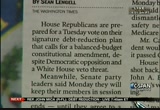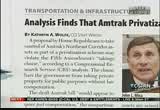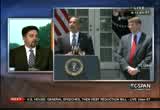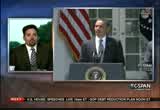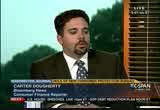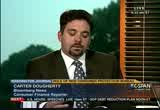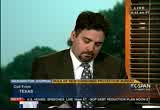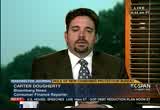tv Washington Journal CSPAN July 19, 2011 7:00am-10:00am EDT
7:00 am
coming up, we will talk to republican congressman john mica about the deficit reduction legislation. then california congresswoman karen bass on the current debt ceiling negotiations. later, carter daugherty of bloomberg will discuss if the white house nomination of former ohio general richard cordray to head the consumer financial protection bureau. >> good morning and welcomed tool ""washington journal" on this tuesday, july 19, 2011. the nation could face the possibility of not being able to pay all its bills within two weeks from now. the focus turned today to a republican house plan called "cut, cap, and balance." there's an increase in the debt
7:01 am
limit on a balanced budget amendment in the bill. is a balanced budget amendment unnecessary? we want to know what you think about it. here are the numbers. you can send us an e-mail. and we are on twitter. our question this morning is whether you think the constitution should be amended to balance the budget. let's look at the news today about the vote in the house.
7:02 am
7:03 am
7:04 am
to give us more information about the house votes today we have a senior writer for "congressional quarterly." good morning. >> how are you? host: what is the intention of the vote today in the house? guest: this is the spending cut plan favored by the conservative house republicans. it is being pushed by the house republican study committee. this is the plan that would immediately make major cuts in discretionary spending, $111 billion in cuts for 2012.
7:05 am
it would accept on discretionary spending well into the future, capping spending as a percentage of the economy, and would make a debt limit increase contingent upon passage of a constitutional balanced budget amendment. this is what conservatives are pushing for in the whole debt limit debate. there's been a debate over the last few months where republicans have saw spending cuts in return for debt limit increases. this is their bargaining condition. behind-the-scenes the leadership and the white house are trying to find a compromise deal to avert a default on august 2. but conservatives are going on record this week but this is there a preferred option. host: you mentioned what is going on in one layer and what's
7:06 am
going on below the surface. what are the meetings taking place? are we expecting to see the president get together with house or senate leaders today? guest: the president met with congressional leaders every day almost last week. peseta they were going to meet every day until they got a deal. the last time they met was thursday. the hopes for a grand deal out of the white house have been dimmed. the house is going forward with this bill as a result. senate republicans are trying to get a vote on the cutting capital balance program as well as a constitutional budget amendment. after the vote, then we will see the real negotiating begin. i don't think there will be white house meetings today. perhaps the house will act on the plan. i think you will see more movement in the senate supports the compromise. senator mitch mcconnell last week put out a compromise of a backup plan and then and gaining
7:07 am
a lot of traction in the senate while not really in the house yet. i think the discussion will shift to that after the house acts on the spill. >> the president said that he will veto any cut, cap, and balance bill. guest: the house republicans -- for all the negotiation talks , there have been very few votes. republicans say they want major spending cuts. the white house has been clear they will veto. this would really appear back spending on the priorities of the white house. they said the balanced budget amendment is not needed to make the spending cuts and deficit reductions that these conservatives want, but they want to tell their base, particularly the partygoers,
7:08 am
that they fought for this. a lot of moderates will be willing to compromise after they get done with this bill. host: what promise is there that after they cut, cap, and balance measure is passed, but others will be willing to negotiate and move toward the mcconnell-reid plan that is evolving? senat guest: senate republicans say they would support that, but would not be party to a default. the question is how did you get the votes? it will probably take a lot of votes from democrats in the house to pass a debt limit release. eric cantor would need to get some compromise from his conference.
7:09 am
they need to know where the votes are in the house republican conference, particularly the tea party freshman. it's not clear what they would support when it comes to a debt limit increase. the cut, cap, and balance plan is something they would likely all support. we would see how many votes it gets. and then the conversation will shift. host: our guest wrote "neither party wants to see the debt limit become a showdown with political and pre economic consequences." there are polls looking at how americans are perceiving the president and republicans and democrats as a bargain through this. is this becoming more of a potential political threat to members? guest: that is how republicans increasingly see it. what was striking about the
7:10 am
mcconnell plan was he decided that the president was not going to support spending cuts. as a result, republicans will probably going to end up taking the fall if there was an economic crisis. i saw polls yesterday saying that the public disapproves of the republican party polit's handling of this. disapprove of the president as well, but more so the republicans. i think you are seeing, among the elder statesman in the republican party, there's a locked of worry about whether they will get blamed for an eventual economic crisis if a default occurs. host: are you sensing of heightened tension in the halls of congress as we get close to the august 2 deadline?
7:11 am
or are things feeling the same as they did a week ago? guest: good question. things are getting the little more tense, but there's still lot of confusion about how this gets dealt with and how you find the votes in the house. i think there was tension in some of the white house meetings last week, but if in the halls of congress people are trying to figure out where the debate goes. two weeks before august 2. the 11th-hour has not quite reached yet. host: guest: banks a lot thanks very much. host: our question is whether you think a balanced budget amendment is necessary? would you like to see the constitution amendment to have a provision for a balanced budget? caller: excellent discussion. very difficult to compare the state and federal when they talk about doing what the states do.
7:12 am
the federal government is in charge of wars. how can we foresee what's gone to happen in four years or five years. if there's a crisis in iran, we have to go there, so that would be a cost increase. years ago we talked about the crisis that would happen if we went to iraq. it was said that it's like a pottery bowl. if you break it, you own it. so that's a tremendous cost. when bush was in office, they did not have the cost of war on the books. the obama administration, it has been put on the books. so we have a tremendous increase in our debt. so there is a serious issue here. some of the republicans and the tea party, it's a philosophical debate. it was great to come in with all the energy and high interest and what they are saying, getting a
7:13 am
things under control, but this is not a kilocycle debate. from a practical standpoint, you have to increase the debt limit with some cuts and so forth, but agree to some tax increases. host: sounds like you are saying that it's not necessary to amend the constitution, to call for a balanced budget, because they are sometimes expenses you cannot predict. do you think if there had been that call for a balanced budget amendment at the time of the iraq war, that iraq war would not have happened because too expensive? caller: that is interesting. perhaps the war would not have taken place. a balanced budget amendment sounds great. you cannot predict the future, necessarily. host: now to. north to to north carolina.
7:14 am
caller: not only do we need a balanced budget amendment, it is critical to our country's surviving. spendingn's reckless is another person's absolute necessity. they say don't touch by medicare or social security or whatever, stallone. these things have spent us into oblivion. all this talk about the budget surplus during the 1990's, we never had a surplus. we always spend more money than we took in. those surpluses were projections. the fact is we are spending ourselves into oblivion and we have lost the ability as a nation to become self- sufficient. as individuals, we are not self- sufficient. 80% of all americans receive
7:15 am
some type of government panned out. host: we have a question on twitter. let's go to our next caller from the independent mind in waterloo. caller: i have major concerns about the country going into rioting. host: why? caller: that me get away from the tv set. what obama is bringing social security, my mom and dad are retired. i am completely dependent on ssi. it is paid by the citizens of the united states for that purpose. it is prepaid. it should not be on the chopping block.
7:16 am
i would love to see president obama go to congress and have both sides there and go through each individual item one by one and it goes or it does not. set priorities straight as to what needs to be done, what we're going to keep and what cut. i would like to see all the troops that are in afghanistan and iraq come home. we simply cannot afford it as a nation. host: let's go to comments made by jay carney yesterday at the white house, press secretary if talking about cut, cap, and balance proposal by republicans, and why he thinks it's worse than the ryan budget plan. >> it requires the passage of a balanced budget amendment and all this would require the even more draconian cuts than the ones that were in
7:17 am
the right and budget. a cut in cleana 1 energy and a significant dismantling of social security plans and medicaid. congressman ryan's plan did not deal with social security, but the draconian savings that are called for in this measure, you have to do that to these programs. we don't need these kinds of measures. what we need is congress to get to work to agree to compromise, to agree to do the work of the american people instead of satisfying a narrow slice of the political spectrum. host: white house press secretary jay carney speaking yesterday. today c-span's facebook page will do a live feed imports going on in the house for over the proposed measure to cut, cap, and balance. you can find that on our facebook page and join the discussion there. you can comment on what you are seeing and share information with your friends. our question this morning is
7:18 am
7:19 am
should there be an eminamendment to the constitution? -- glenview, illinois. caller: no. most people don't understand the debt ceiling. the debt ceiling is dealing with money that has already been spent. the house of representatives is where all spending bills initially have to start. what that means is that every single penny -- the president does not appropriate to anything -. not a penny is appropriated that does not start in the house. every dollar that's in the debt that we spend starts in the house. what that means is the debt limit is money that we have already spent and now the bill is due.
7:20 am
so, where that leads as far as a balanced budget amendment, a balanced budget amendment is something put in place so that we the people, which the house of representatives are the closest representatives as far as the government goes for the people, is to keep us in the future from being able to make decisions about spending, which spending more money in any given year than we are taking in. in some cases that is necessary and done properly in some years you should have a surplus. that will be way in the future now. a balanced budget amendment would be a terrible idea. host: the op-ed piece goes on to say that new members intent on a fiscal responsibility should --
7:21 am
let's go to los angeles, california, adolfo, republican. caller: good morning. we should not include a balanced amendment on the debt ceiling. this would prevent the economy from falling like 2008. it reminds me of the benefits of removing our currency from the gold standard. our economy could be hampered from growing when bubbles
7:22 am
happen. what we can do is increase the credit limit. second, implement austerity measures like those proposed by senator corbin. third, when our economy is growing at a normal pace, remove the austerity measures. this will not happen for the foreseeable future, but if only at our national debt reaches zero. host: you mentioned the gold standard. there's this story.
7:23 am
you also mentioned senator coburn and what he proposed. they spoke about his plan. he would like to cuts a lot from the budget. the biggest proposal so far to cut spending. here's an image of him. we have a comment on twitter that says -- houston texas, bill is on the republican line. caller: i was watching the rules committee yesterday. what struck me was that the frustration among the members on both sides. i felt as if they had a gun put to their heads, having to make a decision that in their hearts they did not want to do. what struck me is that the member from utah who argued that
7:24 am
2.4 to increase$0.4 in the debt, it would only last six months, a short-term fix to the problem. ultimately, a balanced budget amendment provides discipline for the congress, something they needed, because they cannot seem until tackle what is going to be one of the most challenging crises this nation has ever faced. host: here's a comment on twitter. in the plan by senator coburn yesterday, 600 pages. he says it would affect $9 trillion in budget savings over the next 10 years with cuts and reforms. another plan out there right now as we face the potential august 2 deadline debt ceiling.
7:25 am
and how the congress and the white house are reacting is all over the news. is the balanced budget amendment necessary? do you think the constitution should be amended to include that? let's hear from nancy on the democrat line. caller: yes. we don't really need a balanced budget, but we have to pay our debt and we are going to lose our credibility. the soldiers will not get paid. we cannot meet our obligations. we have high prices in gas. we have people that have had disasters that i have -- that
7:26 am
have not been taken care of here at home. they can take away and cut the poor people and the working class people, why don't they take away their insurance? ohio, and's go to jackson, independent line. caller: the social security and the guys, the military not getting their paychecks, that is only fear mongering from obama, that's all. no one should be sincerely concerned about that happening anytime soon. host: what do you think will not get paid if we end up defaulting on the debt? caller: a bunch of dead american people never consented to in the first place. h-- a bunch of debt that the american people never consented to. host: 39% of people say
7:27 am
politicians are the worst they have seen. half of those surveyed say president obama and congress are doing a worse job than their predecessors in dealing with the nation's problems. hyde park, vermont, joe on the democrat line. you are on the air. caller: i was wondering, i realize our commander in chief
7:28 am
as a lot of problems and everything, but i would like to know why instead of cutting social security, medicaid, and medicare, how come he does not cut the medicarewelfare department. people are beating the system, they stay home and don't work and they have a taxicab, to pick up their kids for day care if, they have everything handed to them. our boys are coming home from these wars and everything or conflicts board every want to call them and a lot of them are disabled. where are these young fellows and girls going to go? i believe it's wrong and they're cutting the wrong programs. i know that he has to cut programs, he should not cut the elderly on social security.
7:29 am
they have paid into that for years now. that is all i wanted to know. host: brian, republican, rochester, new york. good morning. caller: hello. i believe the congressional amendment package to the constitution is necessary. there is no other vocational in this country where we can put oversights on spending. i feel that unless we get the spending under control now, i will be the one and to end up paying florida, for this -- i would be the ones to end up paying for this country's debt. maybe not the current cut, cap, and balance, but something needs to keep congress in check. we have already seen that it
7:30 am
cannot govern itself. host: let's look get this image from the "financial times." congress and the president are working to avoid that. one proposal is the cut, cap, and balance bill on the table. part of that calls for balanced budget amendment. we are talking about that today, whether you think the
7:31 am
constitution should be amended in order to doodads? -- to do that? another story, general petraeus turned over command in afghanistan do john allen. the u.s. begins to drawdown troops. here's a picture of general petraeus getting a farewell hug from a german general. general petraeus is leaving to become director of the central intelligence agency. another big story is what is happening with rupert murdoch and his businesses. here's this picture looking at the u.k. hacking scandal and what's happening right now. he will appear before a panel of u.k. lawmakers on tuesday after the phone hacking scandal.
7:32 am
today on c-span3 we will bring you the british house of commons at 9:30 morning where rupert murdoch will test suppor -- will testify before a committee. let's go to the phones again, phoenix, arizona, independent mind. caller: i was calling about the balanced budget amendment. we cannot have that. if you amend the constitution, that means the supreme court eventually if gets to decide what that constitutional amendment means. that means every time congress disagrees, which is constantly, if somebody will file an action, take it to federal court, the
7:33 am
judge will make a decision, and eventually it will be determined by the supreme court of the u.s. and i don't want lawyers making that decision. that's not what our constitution intended. host: let's look at an e-mail comment. and from cincinnati ohio -- and jim weighs in on twitter -- ken joins us from mansfield, ohio, on the republican line. caller: i am thinking about short-term versus long-term and what has happened to every country that is tried to short
7:34 am
term where they want all the perks they can possibly get as long as they can, like greece and france and spain. do we want a crippled country unable to perform as to what we have seen in the past? instead of $200 billion in interest payments, that would go up to three times that. i remember when interest rates were beyond 12% or 15% and how in the world could we pay for the interest rates there? our standard of living would go down and we would not have a secure feeling that i would like to have. so that is my comment. host: let's look at another store in politics right now.
7:35 am
representative waters seeks dismissal of conflict charges in the house. the former staff director of the house ethics committee accused the bill a top committee lawyers last year secretly communicating with republicans on a panel of regarding investigations into democratic representative waters and charles rangel, raising concerns on whether the long ranging inquiries were compromised by key staff members, according to internal committee documents obtained. is a balanced budget amendment necessary? joseph, from houston tx on the democrat line. caller: we have a lot of people
7:36 am
-- host: i have trouble hearing you. please turn down your tv. caller: my name is joseph, from texas. every elected official, should take one year off from pay for every new year that we don't have a budget. host: let's go to mississippi, independent caller. caller: good morning. about the budget amendment, that's a terrible idea. this is what the states have. already they need to borrow money from somewhere to pay their bills. where are we going to borrow money from, and? china?m
7:37 am
all the money to fund the war is is being borrowed from china already. costofwar.org has the information. if we don't start getting more tax revenue, like maybe taxing windfall profits on the oil companies or taxing wall street, this nation will never get out of debt. if we don't start holding the people will bankrupt us accountable for their actions, we will never get out of debt. host: john on the republican line from texas. caller: this balanced budget deal is the only way you can solve this problem into the future also. they have spent us blind with no
7:38 am
controls on them. now we are going to have controls on them. it is just like friday or saturday, obama recognized the libyan rebels and gave them a $30 billion. that's $30 billion coming out of my pockets and everybody else's. we can nip all the stuff like that in the bud. he could've given every man, woman, and the child a million dollars in the country and still have money left over a, but he gave it to the libyans. host: let's go to the commentary that we see today on whether or not there should be an amendment to the constitution.
7:39 am
7:40 am
together and there has to be a voice of reason. host: what does that mean to you? caller: what i mean is it seems to me that there's a lot of political rhetoric and talk about the past and things like that. right now we have a crisis. it is a long crisis. it was like a train getting ready to run off the tracks and everybody could see it. now here we are. at the crossroads. but people anything that be are depending on the in the government to do a job that we sent them there to do. they are the people's government and they are not doing it. nobody is doing its and they have not been, ever since obama was elected. it was like there was never an election. and it continues. now we are in trouble. it is just terrible and it
7:41 am
should not have happened. host: on the republican line, wellcome. caller: i think a balanced budget amendment is necessary. if we did not need it, we would not be $14 trillion in debt. if a person never have enough income to pay all the bills, they did not have to prioritize. obviously, we can prioritize. how about some of the bureaucrats at the department of education, what do they do that is so important to our country? how about cutting some of those people? and high-speed rail, why would we build something like that if we are borrowing money from china and japan every day to pay our bills? host: independent caller now go.
7:42 am
go ahead. caller: why are they picking on social security and disability? they have other things they can cut like a high-speed rail thing and everything. i was just wanting to know if people on ssi and social security will give their tax in time to pay their bills? without them, how are we going to live? host: let's go to the desoto, texas, click on the democrat line. caller: i think the balanced budget amendment is overrated. what budget are we going to balance with all these wars? we need jobs out here. have anyn, we don't more space program or education
7:43 am
or jobs and they are talking about a balanced budget amendments. \ the american people need to wake up banand throw all the bombs -- bums out. host: michael in michigan. caller: congress -- nothing happens without the lobbyists- backed money. they donated so much money to their elections. probably $5 million or $10 million per year. when are we going to eliminate those people so that they started working for the people again instead of themselves and for the lobbyists? they're going to cut $2 trillion over five years, yet the bush tax cuts over the last 10 years is $1 trillion per year, forcing us to borrow money from china to
7:44 am
fight the bourse, which we would never pat to borrow if the tax cuts -- which we would never have had to borrow if the tax cuts were not in place. i would ban the people as soon as they get an office. the senators make $200,000 per year. when they retire, the lobbyists and give them $12 million a year to be a lobbyist. they tell them to vote this way or that way, here is a $1 million check. it's terrible. it's not a republican or democratic thing. it's universal. they are all hot and paid for. sending jobs to china and india. job say let's protect creators, but there are no jobs.
7:45 am
they just keep selling us out and selling us out. host: there is of the work on twitter -- a couple of stories talking about the financial implications of what's going on right now in washington. and a similar story -- let's hear from virginia beach on our independent line, don. caller: good morning.
7:46 am
i would like to speak on the last gentleman's comments. i don't understand why people just don't see a the whole system is broken. our political system is broken. all of these congressmen, democrats and republicans, have too many special interests. the lobbyists are the problem. host: you are echoing comments made by -- caller: they talk about our political system in this country as a sham. host: i think we lost him. let's go to a democratic caller in new hampshire, ron. our focus is the balanced budget amendment. is it necessary? caller: i don't believe it is.
7:47 am
a matter what kind of numbers you put up there, if we need the money, we're going to print some more. to echo the last couple previous callers, it all comes down to special interest. they want to fix the health care system, and save a bunch of money, teardown the tobacco companies. it's common sense. they kill more people every year than practically anybody. the oil and gas companies, the tax loopholes. the poor people don't have tax loopholes. it's nonsense. we spent -- we could save so much money by doing the right things, but it's all special interest. they will not do the right thing. host: what -- how will it play out? we did talk about some polls and looking at the approval ratings congress has, but what do you think will happen over the next couple weeks and how it will play out?
7:48 am
caller: basically, passing the debt limit ceiling, this is all theater. it's not going to fix anything. it will go back to the way it was, with special interest will in the day -- ruling the day. it's a broken system. everybody is out for themselves. everybody's blaming obama for all the spending. there was a trillion dollars on the books before obama even got elected. the other trillion he spent trying to get us out of this mess. that is the message the administration got prior. host: we will speak with a new representative in congress, coming next, karen bass. but coming up, congressman john mica, a republican from florida. we will be right back.
7:49 am
7:50 am
enhanced electronic book. it tells the story of the court through the eyes of the justices. 11 original c-span interviews with current and retired justices. the new edition includes an interview with elena kagan and with the enhanced e-book you can add to your experience by adding multimedia clips. available now wherever electronic books are sold. you are watching c-span, bringing you politics and public affairs. every morning its washington journal, about the news of the day, collecting with elected officials, policy makers, and journalists. weekdays, what live coverage of the u.s. house. and be nice, if congressional hearings and policy forms. and supreme court's oral arguments. on saturdays, "the communicators. on sunday, newsmakers, "q&a", and prime minister questions from the british house of commons.
7:51 am
and it's all on c-span.org, and it's also a triple capped at our c-span video library. c-span, a public service created by america's cable companies. >> ""washington journal" continues. host: congressman john mica, republican, joining us now. guest: thank you. >host: we will talk transportation as you are chairman of the transportation and infrastructure committee. first, cut, cap, and balance is expected to pass the house today. you will vote for it? guest: i will. the situation we find ourselves in, i think everyone is really disturbing across the nation, we have to get the nation's finances in order. it's one proposal. there will be others. but i think that it's a beginning and 87 very
7:52 am
conservative members want to make a difference. i think the others that were sent have to make a difference. this is part of their proposal, to cut of the spending, cap some of the expenditures long-term, and then balance the budget. host: it's possible that not one democrat. may vote for democrat the white house says the president will veto it. guest: it's part of the process. you have to have 435 individuals. all of them want different ideas. someone said there are 435 class presidents and all of them have their own ideas and some of them are bringing them forward today. the good thing about the country is we have survived some very difficult times and this is a difficult time.
7:53 am
the process somehow works. i think this is the plan on the table. i don't know a lot of other plans right now. but we have to do something to get spending under control and restore the nation's credit. we are against a tough deadline. host: marcus writes on twitter -- guest: i don't think it's wasting time. it's part of the process. what other measures are on the table? so you start with this proposal. since i came to congress, we'll talk about a balanced budget. i was one of the few and still remaining that actually voted to balance the budget, and we did balance the budget. to go back when the republicans took over in 1995, it took us a couple years.
7:54 am
basically, 1997 -- actually, the debate on the floor of the house a week before september 11, with $150 billion surplus that year. so it can be done. you have to have restraint. we don't have to close down everything, but we can consolidate. my experience in government is you probably cannot find a single agency that cannot do the job better and save money. this proposal is the beginning. host: a story this morning talking about concerns and the market over what's going to happen with the debt limit. how concerned about the issue are you? guest: my background is in this. the u.s.'s part of the world market now. people judge us on our credit disliked they judge to individuals. if you don't pay your bills, things stop in a hurry.
7:55 am
it takes a little longer for countries that have not been responsible. we have seen greece and other countries in turmoil right now. that's because of their credit worthiness. the u.s. has to stand up, find a way to pay its bills, live within its means, and irresponsible. that's our job as elected officials and the congress has not been doing x. host: a poll yesterday shows 71% of americans disapprove of the way republicans have conducted themselves in the debt talks. guest: i saw that. i am wondering, because by both sides some folks want to do things a little differently. i go back -- when we were debating the last round of cuts, just getting us through this fiscal year, blowback and talk to some of my folks and they say
7:56 am
we're looking at $30 billion to $100 billion in cuts and then you would describe that we have racked up $4.50 trillion in deficit spending, spending more than we are taking in, people would say you are just taking pinking shears around the edges. i don't think a lot of the republicans are happy with what we are doing and would like us to do more. host: and on twitter -- looking at a philosophical approach of the bill versus what senator coburn put on the table yesterday, 600 pages in his plan on how to cut $9 trillion? guest: i would probably not been more toward tom coburn plan. the first thing is it would stop some of the spending. the other thing is every agency
7:57 am
and activity of government, we need to go back and look at how we are spending. we can do a much better job across-the-board. i am chairman of the one -- of one of the larger committees, transportation. i have tried to look at what we have been doing? and, with a whole new way of approaching the way we spend taxpayer money. our committee has been forced to spend more than we are taking in four revenues that we get and most of ours is based on gas tax and fuel taxes and fees that come into a trust fund. we have been spending the trust fund out and we are forcing more government spending, borrowing money. again, everything in this step is expanding its 43 cents on the dollar that we are borrowing, getting ourselves into hock with other nations
7:58 am
and passing the data onto our children. host: we have john mica, a republican in his 10th term in the u.s. house, as chairman of the transportation infrastructure committee. you can call with your questions related to transportation issues, and the big debate going on in washington over the debt limit, some of the proposals on the table. here are the numbers to call -- let's go to sue, a democratic caller from florida. caller: good morning. thank you for c-span. delray beach is one of my favorites. guest: that's part of my district. my brother was a democrat in your area for 10 years. we have had different political parties. good to hear from new this
7:59 am
morning. caller: thank you. i did look at your voting record. you did vote against cuts and you voted for the bush war which we have to pay for. you also voted for the bush tax cuts, but when it came to extending them just to the middle class, you said no. i don't mind a balanced budget amendment, but not when the economy is the way it is. i did work for the school board. i got employees of the year and then i got laid off because i am new to the system. i believe we need to balance the budget. the way my family does it, my husband works two jobs. i will be working again soon. i make much less than $250,000. i wish all the tax cuts would expire. we don't
8:00 am
everybody calling in complaining that we owe all this money -- we do not. the majority of the debt is owed to the american taxpayer. if you are going to cut, you are taking their tax money and cutting what they pay in four. we pay for social security and medicare. i do not mind my money going to education. i do not mind my money going to science. what i do mind is having my tax dollars pay for shipping jobs overseas. guest: i think you make some good points. you covered a lot of ground. first of all, on the tax incentives for business -- i strongly believe that that is one of the things that the government can do to bring jobs to the united states. paul ryan and i sometimes go
8:01 am
round and round -- he has a 25% corporate tax rate. i prefer 12.5%. if you want to attract business, look at states and countries and businesses it -- i would zero out any taxes on manufacturing in the united states. i believe in giving incentives to those who would create jobs. it is hard for someone who makes an hourly wage to pay taxes, and there are 40% of the people who do not pay taxes in the united states. you have to have capital in a capitalist society to create jobs and you have to attract the business to the united states. yes, i would continue to vote for those kinds of tax incentives to create jobs. the other thing, too, is the cut
8:02 am
in cap and trade does try to bring spending as a percentage of the gdp in some reasonable range. the balanced budget amendment is 18%. 18% of our gdp is enough to be spending on government. you do not want people to be hurt who have paid into the system. i think there are some measures to protect. first of all, the military, our veterans, social security recipients, and even medicare folks. it is done with some caution. would i write it the same? maybe not. i think it is a good beginning point to get discussion and debate. everybody knows washington operates under -- that is how we have been that way of.
8:03 am
they wait until the last minute whether it is back in the beginning of the republic or today. i believe the earlier caller said -- this is from the discussion in our forum and our way of government to get to that final decision. host: mike is on our republican line. good morning. caller: good morning. the call that you cited a moment ago -- i wanted to make a note that it was a poll of all adults, not a poll of likely voters. it is worth mentioning. with regard to the war, we hear a lot about that from liberals who are opposed to it. everybody is tired of the war. the fact is, some hussainearned that -- saddam hussein earned
8:04 am
that war. he was the worst danger to our strategic interests in the middle east. i would argue that he was at the weapon of mass destruction. he is dead. final point -- president obama's budget in early this year was voted down in the senate 97-0. that is just a stunning vote. it shows a lot about the seriousness. i question why are there not questions being asked to the president what his plan b is. guest: i think the gentleman raises a couple of good points. talking about the war, i voted the same way. i believe saddam hussein posed a great threat. everyone has to remember the decision was made after 9/11.
8:05 am
i remember flying with president bush. one of our concerns that we discussed -- we did not know whether he really had weapons of mass destruction, but his concerns were when we send troops in, we did not know really how many could be killed. he had used biological weapons on his own people. one of our great concerns was sending troops in and making sure they have the protection. i would vote the same way again. the war was a costly effort and protracted. it was politicized. i have tried not to do that with president obama with his afghan effort. i would like to get us out of both of those. that is my personal opinion, as soon as possible. saddam hussein did have the ability -- we found both
8:06 am
missiles -- i would be glad to show folks pictures of them -- that he was not supposed to have and had the capability of delivering them bank he had a history of using them before. i woke up early this morning and saw a piece on noriega. i remember we took him out for trafficking and drugs and corruption. unfortunately, sometimes we have an obligation to do something similar when someone poses the threat that he did, not only to the middle east, but the world. the lady who called in and lost her job -- it sounded like she had a distinguished record in teaching. from a business standpoint what you see here with a second wave of unemployment, we artificially
8:07 am
subsidize with a $787 billion stimulus bill. a lot of activities -- some of them were teaching, some of them were jobs underwritten at the state level. all of that has disappeared. now we are seeing people lose jobs. there is still 39% after two years sitting in the federal treasury. we will talk about that in a minute. that money has evaporated. now we are seeing the adjustment of. people made their adjustments immediately. now you are seeing the government adjust. that is what is hitting us with a second wave. plus the instability in washington about making decisions from a business investment standpoint. just some of my random comments.
8:08 am
host: congressman mica is our guest. illinois, phyllis is on our independent line. caller: good morning, youngsters at. what i am concerned about is number one, our troops being all over the world, $690 billion in costs. of the war is costing us $1 trillion $400 billion a year and funding for fuel and arms and so forth. we have to end all of that and bring them all home. we always seem to have money since 1980 when ronald reagan took us off the gold standard according to the vice president bush this was a good idea. we have been printing money since 1980.
8:09 am
whether we have gold in fort knox or not to cover it. as far as medicare and medicaid, both parties have borrowed a tremendous money out of those funds. even clinton before he left office -- $600 billion he took out. so he is a crook, t o o. just like the john boehner who has his money invested. i see, sir, three honest men as our representatives. gerry to sandage -- i am an urban planner. in the wanted to get rid of him. then you have bernie sanders. and ron paul. 3 honest people. what is going on that our representatives are destroying our country? guest: you covered some ground
8:10 am
there. i do not know if there is gold at fort knox. i do know that a lot of the paper on our debt is held by chinese and other interests. i do not think that is good. both parties have run up the deficits in the past. both parties need to get some balance to the budget, stop some of the deficit spending, make certain that we take care of folks. i watched this show, too, and when people say everyone is a crook, i have to disagree. there is no difference in congress. i sit there sometimes amazed at the process. i do not think there is any difference in the number of bad folks. we have had some folks in my
8:11 am
civic clubs and the neighborhood, but most of the people here are dedicated. they are trying to do their best. there is a difference in opinion. some of the ones you named -- bernie sanders. i love bernie. dennis cozenage is a fine fellow too. there are many of them in congress. we share different opinions. i have been married 39 years to my wife. we do not have some difference in opinion, but we settle it civilly. there are a lot of good folks trying to do this. the process does work. we have had more serious crazies and we will get it right. we are fortunate we have this form of government to do it in
8:12 am
its. host: let's talk about your proposed six-year service transportation bill. $230 billion, a reduction of 35% from current levels. guest: i hope it is only 33%. everybody tries to talk the talk, and i tried to walk the walk. i have a portion of the federal responsibility. we are seeing our ports, our water resources, a host of agencies. we are trying to be responsible. as i mentioned earlier, we have money coming in, a federal trust fund that supports most of the highway service transit projects. we do go get a gallon of gasoline, you pay 18.4 cents that comes into that trust fund at. we get in at about $35 billion a
8:13 am
year. my goal is to spend within that. to the house passed a rule that we could not authorize beyond that. host: so only spend money from the trust fund. guest: exactly. not that we cannot go to the ways and means committee -- we are an authorizer. i have my ideas. it does not raise taxes or revenues. we are limited to that trust fund. what i try to do is more with less, to leverage that money, to take the money that is coming in through a host of mechanisms, some state infrastructure banks, making programs that work. make them work better.
8:14 am
then i have programs that do not work at all. we have had $36 billion in capacity that is not used. make that work. that gives me more money. is send a proposal that is out of that spent the money for two years spends out the trust fund, actually bankrupts it. i have a chart on what our proposal does, which is the first chart up there. you can see what obama and the senate proposal does. it bankrupt in two years. they are spending a lot more not knowing how they are going to make up the difference in. host: this is your proposal. the second one down is if current funding levels are maintained at. you can see the numbers going down.
8:15 am
finally, the administration's proposal. guest: allegany, my proposal is trying to take what we got, -- again, my proposal is trying to take what we got, and spend it efficiently. john mica is not going to and transportation projects as we know it. will start out with about a dozen projects. we consolidate some 70 programs and some are eliminated. we think we can do a better job. we do not eliminate -- a lot of people said you are going to eliminate bike trails and all of these programs. we are not. they are still eligible for federal funding. we do not have a specific program that mandates you have to do it in washington bank in those programs are
8:16 am
authorized, but again, we consolidate them or eliminate them at the federal level. host: a congressman said this bill can be called the republican road to ruin -- what is your response. guest: i would differ with him. we have had subsequent meetings and i have told him, first, i think we work very well together. we do not have a choice on presenting a bill that spends more than we take in. that is a part of the budget. so, if they want to spend more, there is a means of doing that. i invite them to make a presentation with me to the winds and means committee if they want to raise additional revenues and tell them how.
8:17 am
the senate proposal does not explain how it will do it other than spending out the trust fund. i think it is the road to responsible expenditures in transportation. again, if you could be more creative, taking what we got and doing a better job with it, we will spend less and get more. host: the difference between your plan and what is happening in the senate, this week from "bloomberg business" -- host: the senator said we spend billions of dollars a month. she is trying to put it in
8:18 am
perspective of what else we are spending our money on. guest: we are spending it the way we always spend 8. do i need all the programs that we have in washington? can i spend less and get more for it in projects? i believe we can do that. can we take washington out of the process? if we can take them out of the process -- actually, washington does not build highways or transit systems. it is all local and state governments. host: let's go to terry, a republican caller. good morning. caller: good morning. theery police force in united states spend half their money or more on the drug war.
8:19 am
the court cost together, over $400 billion a year spent on the drug war. my stepfather was the state parole officer and told me year after year that different parolees that you could buy a legal drugs from inmates but you could get a much better deal from the guards. an article in the local newspaper said today are checking the cards -- 38 different cards came up with an illegal drugs in their system. host: what is your message? caller: stop these orszag, stop wasting our money. the drones -- bring our men home. guest: we have had a couple of callers commenting on the war. i went to afghanistan for the first time. i did not go to iraq.
8:20 am
quite frankly, i would agree with the callers that have expressed opinions about getting our troops back home as soon as possible. i want to do it responsibly. the cost is cost prohibitive. this discussion has been going on since george washington gave his farewell address to limit our foreign involvement. it is expensive in lives and cost. as soon as we can do it, i would like to do it. i agree with him somewhat. i cannot make the final decision. it is up to the president and the full congress. we are also working on transportation to try to save some tax payer dollars, both of the way we finance programs and also proposed in our particular measure from our side of the oil, a streamlining of the process which almost every state
8:21 am
secretary of transportation said will dramatically save us money. i know that mrs. boxer has some streamlining. but we can save an incredible amounts of money by speeding up the process, limiting the amount of times for approval, making approvals run concurrently rather than consecutively. that is another means at. are legislation has more value both in the projects that can be done in saving taxpayer money at the same time. host: one of the items that you talk about is privatizing a section of amtrak. this story recently says -- that is according to the
8:22 am
congressional research service at. -- service. what do you think about that? guest: i have seen the report. our council advises us otherwise, that we are not taking a legally, that we do have a provision for compensation within the measure that was proposed. what we are talking about here is trying to -- if you are going to do a high-speed rail system rather than spend $8 billion on dozens of dozens of snail speed marginal projects, that we look at one's success. the northeast corridor runs very poorly, the service is 83 miles per hour. it was a disaster wind of the program was put together. we could spend a whole program
8:23 am
talking about that. i am trying to engage the private sector which would bring in capital if they were allowed to participate to make this a truly high-speed system. it would release some of our contestant in the corridor. amtrak asked for $117 billion. members of congress will turn blue before they give them that money. to me, that is not the answer. we have a counterproposal, and some folks do not like it. host: a good morning. caller: good morning. congressman mica, i have a comment to make and then a question. i have worked for 37 years in the health-care profession. yesterday, i was called by a hospital because i have a pending surgery scheduled for next week. my deductible is $200 per day.
8:24 am
first six days at. after six days, there is no charge. well, i am on social security. what is amazing to me is that i would have to pay $200 a day to go into a hospital and have a surgery under medicare. the other comment i would like to make is to say that you all are planning everything on president obama. host: maxine, good luck with your surgery. guest: the lady faces a difficult challenge. eight of hundred dollar charge. i do not know all of the particular. we have to do a better job helping folks that have limited incomes. we also have to have some copays for folks who have greater means. when you look at the whole
8:25 am
budget and expenditures, medicare and our health care is a huge portion of the federal budget. i am sorry about that. again, i have tried to say that both sides share responsibility for the situation we have gotten ourselves in. both sides have to get the car out of the ditch. host: joe in arizona, it republican, welcome. caller: thank you very much. we do not bring up term limits in of. toward washington said the government -- eloquence is not reason, it is a force. basically, anyone who wants to raise the debt ceiling, they want to destroy us from the inside. they do not love this country. we need to cut of the government-backed. we have so many different agencies that we need to get rid
8:26 am
of. like the atf, the department of energy, corporate welfare -- we need to go to a flat tax or a fair tax in this country. guest: i have supported a dramatic revision of our tax system and i have supported a fair tax concept. the gentle man -- you could hear his frustration and others. there are agencies that we could dramatically change, some that have outused their usefulness and many that can operate much better and save money. it is so frustrating to see some of that -- a member of congress not being able to change 8. we just have to roll up our sleeves and go back at 8. sometimes out of crises, better things can happen.
8:27 am
that has often happened in congress and in the united states. even with facing this looming debt crisis, we can make some changes that will benefit us all generations. host: a piece in the new york times today says -- he says this could turn out to be a glorious moment in republican history. but he writes, -- he lists a couple of categories that he creates it. he says that --
8:28 am
which brings us to one of our twitter commenters. guest: well, he is one person who has his opinion. ards a to lean towrad conservaitve line. i heard somebody talking about having a couple of jobs to survive that. i have done my share in the private sector, sometimes with a three jobs at the time to make ends meet. i am very conservative with my own personal finances and with the public finances. i think we have to be that way. i think the impact of norquist and some of these other people is overblown. host: did you sign the pledge?
8:29 am
guest: no, i haven't. one of the things, i think, again, people forget that the public rules the roost. the public just sent a wave of folks to congress. that wave of congress is being reflected in what you see. so, the american people reigned supreme in this process. people talk about special interests and term limits and. the founding fathers imposed term limits and imposed them on a lot of folks last time. so, it does work. again, the media sometimes takes some of this power out of context. but what will happen is, again,
8:30 am
we have to act responsibly. we are facing a very serious crisis. this is not just some political game. we have the full faith and credit of the united states at stake. how will it end? i honestly do not know. i go on in my particular round in trying to be responsible and a good steward of taxpayer money in my little circle of transportation. host: let's get one last caller for congressman mica. michael joins us from florida. caller: good morning and thank you for taking my call. politicians are really trained in political correctness. i hear a lot about 40% of americans do not pay taxes at all.
8:31 am
one more question, was planning on it asking -- our unemployment may be beneficial to us. what do you think? host: starting a war on unemployment. guest: you have to have people that create jobs. we have to have incentives for folks to employ people. the economics of it are pretty simple. a capitalist system -- you have to have certain constraints and some things in place to make certain that you have open and free competition across the board. the war on drugs is a tough one. but you have seen countries that left the war on drugs to go crazy. columbia almost came down.
8:32 am
mexico -- the violence is unprecedented. they are almost becoming a narco-terrorist state right now. of the united states can do a better job with folks -- the united states can do a better job with folks who have drug problems. those that traffic, i would show no mercy. host: two weeks away from the u.s. potentially a default on its debt, if congress does not decide to act, this story from "the hell," -- -- "the hill," -- people say that the house is the place where there has to be some
8:33 am
agreement. guest: there is going to be a balanced budget amendment. i do not know if it will pass the house. the one i have not -- >host: when will you make up your mind? guest: when i hear all the four proposals from the debate. other times like this, you have to see what the options are. that is what is going to be presented. but we do have to resolve the issue of. host: congressman mica, a republican of florida, chairman of transportation. thank you for being here this morning. later on in the program, we will speak to a bloomberg reporter, but first, karen bass representative from california will join us.
8:34 am
>> more on the economy from wall street. bank of america posted its second quarter loss of 90 cents per share, a wider loss than what analysts had expected. part of the loss was a result of bank of america's $8.5 billion settlement with mortgage bond investors. dow futures are up 76 points. secretary of state henry clinton says the united states is encouraged by the ongoing talks between nuclear armed rivals india and pakistan and promises to give full support to indian efforts to protect itself from whatever. a triple bombing killed 20 people in mumbai. a spokesman says a the country had been stalling new and efficient centrifuges aimed at speeding up its nuclear enrichment.
8:35 am
tehran may be moving toward weapon-grade arms. he did not elaborate on the specifications of the machines bank in london, rupert murdoch has arrived at britain's parliament ahead of his appearance before lawmakers. he will be questioned about the investigation that brought down the newspaper. his son and rebekah brooks are also expected to appear. those are some of the latest headlines on c-span radio. >> the c-span network -- we provide coverage of politics, public affairs, nonfiction books, and american history. it is all available to you. find our content any time throughout c-span's video library.
8:36 am
bringing our resources to your community. is washington, -- it is washington, your way. >> ann coulter has something to say. sunday, august 7, your chance to talk to the new york times best selling author and syndicated columnist. three hours, starting at noon eastern on c-span2. >> "washington journal" continues. host: karen bass, a democrat, representing california's 33rd district. good morning. talk to us about the cut, cap & balance vote today in the house. do you think any democrats will vote for it? guest: frankly, i think it is
8:37 am
very, very bad policy. some of the measures that are in this bill already exist in california. for example, it only takes a majority vote to cut taxes in california, two-thirds vote to raise revenue. everybody every year watches the impact that happens in california where the government gets to the point of shutting down because we are not able to raise revenue. if our hands are tied in california, why in the world would i want our hands to be tied across the country? the cap i think is bad news. if you were to cap spending at 18%, the last time we spent 18% was in 1966. so when you have a crisis like a recession, if you have a cap on spending, how do you raise unemployment when you have large numbers of people that are
8:38 am
unemployed? i think it is very unwise and does not have a thing to do with raising the debt ceiling. it is going to be debated, it should be debated completely outside of the discussion of raising the debt ceiling. host: making these massive cuts or going for the 18% of gdp spending -- guest: exactly. we should stop for a second and say why should the republican leadership do this at this time? in my opinion, it is a diversion of the main issue of raising the debt ceiling. i am a freshman and our class is over 90 members. 80 plus members -- many of them are in the tea party. they made pledges that many of them have to act upon.
8:39 am
the reason we are having the vote is so those republicans can at least a vote for something that they can go back and say we tried to pass this. you know what it takes to pass a constitutional amendment. it has to go back to the state's. we are within days away of a major the fault in our economy and raising the debt ceiling, so there is no reason to be having the discussion right now except for as a diversion of the new members of the republican caucus at. host: let's take a listen to president obama's comments about what he wants to do with social security and medicare. >> you can envision a situation where someone in my position, me having to pay a little bit more on premiums or copays or things like that, would be appropriate. that could make a difference. so, we have been very clear about where we are willing to
8:40 am
go. what we are not willing to do is to restructure the program into ways we have seen coming out of the house over the last several months, where we would voucherize the program and you would have senior citizens paying more. i view it as the most important social safety net that we have. they need to remain to give people certainty and reliability in their golden years. it turns out, making some modest modifications in those entitlements, can save you trillions of dollars. it is not necessary to completely revamp the program. host: president obama speaking recently about modifications that he would be willing to make it to social security and medicare. guest: let me just say that
8:41 am
social security is ok for the next 26 years at. in my opinion, social security and medicare should not be a part of the discussion about raising the debt ceiling. the debt ceiling was raised seven times in the bush administration with nothing attached to 8. the president is trying very hard, bending over backward, to make concessions, and he still cannot bring the republicans to the table on a balanced approach that includes revenue. a discussion around the entitlement programs, i do believe you can make changes, but the discussion should happen separately so nothing quick is done that would injure one of the most important safety net programs in our country. are guaranteed to seniors and those who are disabled -- that is something that has been a part of our country for decades. in my opinion, it is something
8:42 am
that we should celebrate. instead of ending medicare, i think we should be celebrating. host: a recent story talks about minority leader nancy pelosi, taking a position slightly different from obama, saying -- guest: let me give you an example. you can make a change to medicare that is a cut but does not change the benefits. for example, at least once a year, many of the news magazines on tv will do stories about fraud in medicare. so there is billions of dollars
8:43 am
in the fraud that could be reduced, cut, or eliminated in medicare. do we take the time to do that right now? we are mixing apples and oranges. there is no reason to talk about entitlements in the same discussion about raising the debt ceiling. the debt ceiling should be raised on its own. host: she represents california's 33rd district. she is in her first term, one of the few democrats to come into her first term. guest: today, we will be swearing in the 11th democrat. i have gained a little security. host: prior to your job, you were in the california assembly. the work of the house speaker. guest: yes, i was. host: what have you learned from that? when you were doing that job,
8:44 am
gov. arnold schwarzenegger was sitting in the governor's seat so you have been on the front lines. what advice do you give to the leaders of the house and senate right now? guest: i do not think i have to give any one of them advice. let me just say that i did sit in the room negotiating the budget, and unfortunately i felt as though i was a hostage with a ransom note. i had to decide what on the ransom note that i was willing to do. my republican colleagues in california put the same measures on that ransom note for us because california required a two-thirds vote to pass the budget. now it is just a two-thirds vote to raise revenue. my republican colleagues put a spending cap on the table, a measure that said it would take a two-thirds vote to raise fees, not just taxes.
8:45 am
some of the same measures being called for right now the republicans where the same measures that were called for in california. let me just tell you, you know what we did it? we shut down. if we do not raised the debt ceiling, then the treasury has to decide which bills to pay. 44% of our bills could go unpaid. that happened in california. many of our small businesses closed that were dependent upon a contract's with the state. employees were not paid. i would hate to see this happen on the national level. we know that if the economy of the united states defaults, that has international implications of. it is just incredibly irresponsible to drive us to a cliff and say we are going to put the u.s. economy to a cliff
8:46 am
unless you meet these demands. there were sweeping policy changes they know they could not pass on your normal circumstances. host: a democratic caller, good morning. caller: good morning. guest: good morning, anthony. caller: i have a few comments for congresswoman bass. regarding social security, i am made retiree. we do not think social security should be cut one bit. guest: i agree with you. caller: how many wars are we fighting now? afghanistan, iraq, pakistan, libya, and soon, as mr. leon panetta says, we will be fighting in iran. we have military operations all over the middle east.
8:47 am
why can we not divert some of those funds and not cut social security? because social security never impacted on our pay. social security was a funded all along. why are we cutting social security? guest: let me assure you that we are not going to cut social security bank and i think there might be efforts in the house to cut social security and they might pass out. -- pass. you need at least 50 democrats to vote for it. i guarantee you that if and the measure passes the house to cut social security, it would probably not be taken up in the senate, and if it did, i believe the president would veto it. you have paid into social
8:48 am
security all of your working life and you deserve to have that guaranteed for you. i would love to see the united states out of all the wars that you described, and i hope we do not have to engage in war in iran. social security is solvent for the next 26 years and we need to be sure that it is solvent past that but there is no need to do that in a hurried manner. host: one of the folks on twitter writes -- arthur elements of the proposal that he would support if it were removed from the debt ceiling debate and it came up in six months? guest: no, i do not believe so. do i believe that we should have a balanced budget? of course i believe we should have a balanced budget, but in the manner that the republicans are proposing it, no.
8:49 am
perhaps there is some measure of which i could support, but at this time, i do not know what that is. host: it includes cutting spending in fiscal year 2012 by a $111 billion and caps on future spending at 18% of gdp. it includes a balanced budget amendment which would be contingent. guest: i sit on the budget committee. we have had experts testified that in the sad state that the economy is in, we have to be very careful at making cuts. when we cut, people lose their jobs. why would we want to throw more people onto the unemployment rolls? caller: i would like to reiterate that i agree 100% with the previous caller. i would like to add that i
8:50 am
think our leadership is focused more on -- should focus more on domestic policy and foreign policy. we are spending far too much money overseas. i think that might alleviate some of the problem. guest: thank you very much for your comment. i certainly agree with the previous caller, too, that we should not cut social security. you should know that when it comes to foreign aid, foreign aid is a very small part of our budget. we absolutely need to look at domestic priorities and we need to continue to make investments in education, ind the sciences, in research. we should not cut areas that compromise our country's ability to be competitive on the global scale. host: representative karen bass is our guest, representing california's 33rd district. prior to that, she served in the
8:51 am
california state legislature and was the 67 speaker of the california assembly, the first african american in the country to service in this state legislative role. eric writes on twitter -- he is concerned. he wants to have some guarantees that there is going to be some changes in spending. guest: i really do believe there will be some changes in spending. we should examine programs. for example, i was looking at the report from the gao office that showed there are a lot of programs that we have that are really a duplication. there are a lot of things that we should do to reform spending. i believe the level of discourse and concern over spending after we raise the debt ceiling, i do
8:52 am
think we will begin serious discussions around cutting spending. the democrats did offer a proposal around the budget that did call for billions of dollars in cuts. host: robert is on our d emocrats' line. caller: there is only one cut i could see that could be made, and that is for an illegal immigrants because they never paid into social security. i do have a suggestion. here is a guy out oof georgia. if you count a penny for every dollar that you take out of taxes, that would help you balance the budget because you get $36 million a day. what happens is it goes on to
8:53 am
say that if you cut down certain programs and leave some alone, 60 cents out of every dollar that is taken out of taxes is paid for and then you borrow 40%. $36 million, i think, would come in every day would balance the budget. that is something i think you people should look into. he has people on the hill lobbying now for 8. he only has 50 something people. thank you for my comments. guest: thank you for the suggestion. i do want to comment about something that you said in the beginning, which is people who are undocumented who are the citizens of the united states do not receive social security checks when they turn 65. i agree with you that we need a comprehensive immigration policy. host: a bald from chicago,
8:54 am
illinois, good morning. -- bob from chicago, illinois, good morning. caller: i wonder if the representative would be good enough to explain to me why president obama is talking about not being certain that he could write social security checks on august 3. guest: sure. i believe the comment that the president made -- he was asked if the debt ceiling is not raised and we have to make a choice between what bills we pay could not guarantee that social security would be paid, and he said he could not guarantee it. the president has attempted day after day to compromise with my colleagues on the other side of the aisle, and he has not been able to bring them to the table to understand that if you are going to, and one should argue
8:55 am
if you should do it this way, but if you are going to attach deficit reduction on to raising the debt ceiling, we should do it with a balanced approach. i am of the opinion that we should have a clean vote to raise the debt ceiling just like we did seven times under the bush administration. i do understand that the mitch mcconnell proposal does call for giving the president authority to raise the debt ceiling on his own. that will be discussed today in the senate. i think that is a good idea. the day after that bill would be passed and signed by the president, the president would raise the debt ceiling. within 24 hours, there would be a commercial that said the president raised the debt ceiling without support. host: talk about the implications of that. at this point, the hill that is
8:56 am
saying that the fall back is becoming plan a. guest: i would love to think that senator mitch mcconnell was thinking pure to give the president the authority. there are two versions. 1 giving the president the authority to raise the debt ceiling, but also automatic cuts that would happen. there is another part that if there are not automatic cuts, there would be a committee that would decide on the cuts at. i would have difficulty if it was attached to automatic cuts. the political implications are of a concern to me. host: do you think that is the most likely way to avoid
8:57 am
defaulting on the debt? guest: at the end of the day, i think we will have a planned. host: let's hear from a democratic caller from new jersey. welcome. good morning. caller: i just wanted to say that i think both sides are just out of control. i wonder how long it will be before people wake up and realize that this debt is never going to get paid back. the cards will fall where they will bank the kids of the future -- you are putting it all on their in shoulders. do you think they will say let me spend 70% of my paycheck every week to finance the government? no, they will not do that. sooner or later you will wake up and realize that you have to cut. you are like heroin addicts at. it is like a black called.
8:58 am
when will it end. -- it is like a black hole of. when will it end? guest: the tax breaks given to millionaires -- we could close all sorts of tax loopholes on corporate jets to big oil companies. there is a variety of ways that we could recapture the revenue that was given away during the bush years. there are ways to reduce the deficit. i do think that we will do that and do it over time. my concern is attaching two issues that should not be connected as a way of pushing through areas of public policy that you cannot get through under normal circumstances. host: at a recent caller mentioned that penny solution. he has a plant called a one-cent solution and it is his vision
8:59 am
for solving the debt crisis. his proposal has been turned into legislation sponsored. guest: i would be interested in looking at that web site. host: you can go to the c-span archives to find out more about that. a caller from georgia, on our republican line. welcome. you are on with representative karen bass. caller: you are not going to like what i have to say. i look you as the epitome of the problem. you are a big government supporter and come from a state, california, that leads in the nation in many, many things, and certainly leads the nation in going broke. the government is not the answer. free enterprise is the answer,
9:00 am
unlocking people from its debt and taxation. we have been duped into thinking that this horrendous the debt that has occurred, spending habits in washington, are necessary and proper. is not. it is tearing this country apart. people are like children. they keep thinking that this is the way that life is. i think they should lower the debt ceiling by 50% of. guest: we should not raise it? we should lower it? caller: absolutely. this kind of out of control of debt it is not -- host: i cut you off, pete. i did not mean so. what do you think? guest: i think we need to take a look at our spending.
9:01 am
there are ways to reduce the deficit. i gave several ways that we could reduce the deficit a couple of minutes ago. i look at spending as our national treasure were that was given away when the bush tax cuts or put in place at. there is a lot of spending that we do through tax loopholes, and i think those should be closed. host: representative karen bass is our guest. one of our callers says --
9:02 am
for those people that want us to crash, if you are expecting a tax refund, you will not get it. if you are in the military, you will not get paid. take for example, all of us have to deal with credit, the three companies that exam our credit. if you could imagine that your credit scores dropped overnight, that would happen to the u.s. economy. if you could imagine you have a 401k plan and all of your earnings evaporated in a few weeks if we default. the very people that want to drive us to the edge, i do not believe they understand they will be hurt the very next day. the problem is once you de fall like that, the damage it could do to the economy, we could
9:03 am
suffer for years. host: jacksonville, fla., and joins us on the democrat line. and caller: good morning. i am a single mother that has been on social security now for three years. i, too, agreed, that there should not be cut. i will be turning 55 in two weeks. i understand all republicans voted for that plan except for four. if the senate accepted the plan, what did they still have to raise the debt limit? they still have to raise the debt limit? guest: yes. that plan was adopted by the republican caucus and both houses, and that plan calls for
9:04 am
ending medicare. when you turn 55 in the next few months, if the president were to sign the republican plan for medicare, you would be out of luck. what that would mean is you would then be required to pay a lot more money than you might have right now. essentially your medicare share that the federal government pays would be turned over to a private insurance company, and you would have to hope they would be willing to cover you. fortunately the republican plan to end medicare did not go anywhere in the senate, and even if it had, i am sure the president would have vetoed it. host: a message for you on twitter -- let's hear from scott in a hot meal on the independent line. good morning, scott. inlet's hear from scott ohio on the independent line.
9:05 am
caller: everyone is supposed to do more with less right now. the gentleman you just had on before this lady here, he was in charge of the transportation department. the trade petition department has to do more with less. in the ohio area every school is facing layoffs. but the only people that cannot seem to do anything with a little bit less are the old target. it is heartbreaking what is happening here in ohio. our fire fighters and policeman, any public service has to do with more with less, but the rich cannot do it with a penny or two less. it is heartbreaking that any tax increase or any loophole closing is out of reach. guest: my republican colleagues
9:06 am
have taken to calling the rich the job creators. we should do whatever we can to make sure they are comfortable and have the most money to create jobs. i do not believe that has proven to be true, because under the years we have the bush tax cuts under the bush administration, we were losing hundreds of thousands of jobs every month. you are talking about us doing more with less, and that is because the recovery has been very slow, and states are having a big difficulty. the economic stimulus passed a couple of years ago that provided funding to a number of states, unfortunately that money has run out. that is one of the reasons why we're seeing layoffs and further cutbacks in states. i would agree with you, i think we should end the bus tax cuts. -- and the bush tax cuts. i think the 1% should pay more
9:07 am
of their fair share in close many of the loopholes. host: i want to read a little bit from abc news, one of their blocks. she asked -- the you share those concerns? -- do you share those concerns? guest: i have only been in congress six months, but in my six months i think the president has been disrespected on many occasions. i was not here when the democrats voted to raise the debt ceiling seven times during
9:08 am
the bush administration. i do not know whether they attached a whole bunch of demands to their votes to raise the debt ceiling. i do not recall president bush being asked to show his birth certificate. i am not sure his education was questioned in the same way our president has been here yet and the six months i think he has been disrespected repeatedly, however, i do not have another president to compare it to. host: what do you do with that information that you have is you go into the moment of debate in negotiations? guest: i believe in the world we work in, i always tried to work with my colleagues on the other side, and i have found many ways to do that. i was able to get an amendment passed on human trafficking. i work with my colleagues on foster care issues. you cannot take these situations
9:09 am
personally. you have to separate your emotions from doing the work of the country. i will go in and work very well with my republican colleagues. host: you have outlined concerns about what happens if the debt ceiling is not raised, but do you see that as a possibility? guest: i really do not think so. my only experience is california. i had to negotiate the budget on five different occasions, because our economy was so fragile. things and getyed thiy up to the moment, and i would not be surprised if we wait until the last minute. there are two last minutes. host: there is procedural action that has to be done here ye. guest: the president said he
9:10 am
wanted deal by july 22. i would put my money on july 22. and it might be a late night. host: karen past joining us this morning. thank you. -- karen bass. coming up, we will hear from carter gordy, bloomberg news. -- dorothy. first, a news update from c-span radio. >> is department reports that housing starts were up in june. builders broke ground on more single-family homes and apartments. this resulted in a 1436% increase from may. still, economists say that is half of the home building needed to sustain a healthy housing market. the space shuttle have left the space station for the last time.
9:11 am
florida homecoming will mark the end of the 30-year shuttle era. an update on the investigation of phone hacking and britain appeared in london's outgoing police chief says 10 of 45 press officers for the force are former employees of rupert murdoch's news international. he denied knowing the newspaper was a gauge in phone hacking. rupert murdoch testified before a parliamentary committee coming up in just under 20 minutes. you could hear it live on c-span radio. those are some of the latest headlines here on c-span radio. to go with titles like "slader" and "guilty" anne coulter has something to say. your chance to talk with the author in debt for three hours starting at noon eastern live on "booktv." >> the supreme court is now
9:12 am
available as a standard and enhanced ebook. 11 original c-span interviews with current and retired justices. this current book includes interviews with elena kagan and the enhanced ebook add to your experience by watching multimedia clips from all of the justices. available wherever ebooks are sold. >> news yesterday that the president has chosen a nominee to lead the consumer financial protection bureau. our guests, carter 4dougherty is here to talk about this organization. guest: this is created by the regulatory overhaul that president obama signed into law, almost exactly one year ago.
9:13 am
it consolidated supervision and regulation of banks when it comes to consumer finance, mortgages, payday lenders, your credit card. this put into one agency. she was tapped by president obama in last fall and september to begin setting the bureau up here yet take you have a recent profile about elizabeth warren talking about how she came up with this idea. it really was her brain child. writer througho wate the thought process. guest: elizabeth warren has a long track record of working in consumer finance. she worked especially on bankruptcy. she is a professor of law from
9:14 am
harvard. she came to the conclusion you needed a single regulator to impose a single set of rules. she said she had a moment when a credit card executive said that only rules were applied to everyone would force them to abandon the a lot of tricks and traps. to go she talked to that conversation with one of the credit card guys and said if we're closing 18% interest and are charged the same or even more. -- host: she talked to that conversation with one of the credit card as and said if we are closing 18% interest and are charging the same or even more. guest: the metaphor is change to
9:15 am
the cop and beach. the logo is a share a shield. host: yet she was not chosen to lead the agency after all. yesterday the president made his formal introduction of the nominee. the news came out over the weekend that this would be the gentleman to leave the agency. tell us about who he is and what his role has been so far. guest: is a guy that i got to know after he was defeated as ohio attorney general. he got the call from elizabeth warren sometime in november after the election. she said would you like to come over to the consumer hero and be the enforcement chief? -- consumer bureau and be the enforcement chief? he has sued aig. a couple others. he is a bulldog. he is tenacious in his
9:16 am
litigation, and he initially was working on setting up the enforcement division of the consumer bureau, and at some point in the process the white house decided he would be a great can get it to actually run the show. host: it is an interesting political moment when we see elizabeth warren. she was actually at the white house press conference yesterday when president obama introduced him and talk about his resonate. he also think elizabeth warren for here -- thanked elizabeth warren for her contributions. guest: this is still a bit of a mystery exactly why the white house chose this particular route. in part, because 44 senate republicans said they will not vote to confirm anyone until there are changes in the structure, so that naturally ranges -- raises the question of it she conceived of the idea and
9:17 am
setting it up, why not nominate her? we do not precisely know the answer to that question. i suspect the white house decided there was advantage in trying to have been invented in not nominating born. yesterday she moved immediately in a very proud nation as advocacy role that is hard to pull off if you art of regulator at that time. there may be logic there as well. she is also working hard to bring on board the sort of democratic interest groups whose support the cfpb. i suspect there was a role she could play on all cited one not work on the inside. the: we're talking about consumer financial protection bureau and the man nominated to be the new head of its.
9:18 am
he would be the first head of it if he is confirmed by the senate. as our guest just outlined, it will be a bit of a bottle, because we have this letter written to the president were 44 republican senators have said we will not go for a and approve your nominee unless we see changes to this body. what do the republicans want to see changed? guest: in particular, they would like to see it moved away from the model. they embrace the model of a single director. the republicans would like to replace that with a five-member commission. there are a few other issues with it, most relating to the funding. it would like to see it subjected to the annual appropriations process. they have a dedicated funding stream come in this case from the federal reserve appeared in
9:19 am
these are areas that have been in effect become a proxy fight for do you support the consumer bureau or not? if you did support it, then you are finding the answer. host: what would the difference between having a panel vs just one head? guest: i can tell you what the fears are. they are namely that the panel commissioned would get numb up in the partisan gridlock that has become common in a place like if the election commission,, and more recently of the consumer product safety commission and no longer be a arm, cop on the beat.p
9:20 am
>> the president announced his nominee to run the consumer financial protection for bureau. i would remind him that senate republicans still are not interested in improving anyone to the position until the president agrees to make the massive government bureaucracy more accountable and transparent to the american people. back on may 5 of the sheer 44 republican senators signed a letter to the president saying we will not support the consideration of any nominee, regardless of party affiliation to be the director until the structure of the consumer financial protection bureau is reformed. we have been very clear about what these reforms would need to look like. republicans have voiced serious concerns over the creation, because it represents a government-driven solution to a
9:21 am
problem government helped create. we have no doubt that without proper oversight it will only multiplied the kinds of countless burdensome regulations that are holding our economy back right now. that it will have countless unintended consequences for individuals and small businesses that constrict credit, stifle growth, and destroy jobs. host: mitch mcconnell speaking on the senate floor. our guest is the consumer financial reporter with bloomberg news. here are the numbers to call if you would like to join the conversation -- let's go to hartford, north carolina. beverly is on the independent line. good morning. caller: i agree that we need this.
9:22 am
i had to call the protection agency in north carolina at least three times for help, and they helped me tremendously. i do not know what is wrong with the republican party. they do not have want to have anyone that does not make a lot of money, but i really am concerned about why elizabeth warren was not chosen. that was her baby. i wanted to know if president obama could choose another person, then why did he not choose her? just come out and make the choice, whatever he did. why did he not do that? thank you. guest: very interesting comments. you are not alone in saying that you've talked to your state regulators. this is a common complaint i have heard. i have travelled a bit in covering this. state agencies have often been some of the first jobs that people make in trying to deal
9:23 am
with their problems. as to exactly why he did not nominate elizabeth warren, i think there was some calculation and the white house but perhaps it was better to have her on the outside working on behalf of the consumer bureau ban on the inside. i suppose time will tell. i will tell you that she is somebody who i think it is fair to say is most naturally at these and working on behalf of the causes she believes in me when she is at least from official duties. it may turn out to be that having her on the outside is better than the inside. host: there is speculation she may run for the senate in massachusetts. she does plan to go back to harvard. guest: there is some polling that suggested she is far behind brown, as is everyone else. she has decent name recognition
9:24 am
for someone that is not originally from massachusetts. it will be interesting to see whether she can make that work. i am told that democratic donors actually fall over themselves. they would like to support elizabeth warren. tom inlet's hear from georgia. republican calller. caller: i do not understand what is wrong with republicans, and being one i am ashamed that they are so adamantly opposed to this. the most unpopular businesses in this country are mortgage companies, credit-card companies, credit bureaus, all of these kind of people have something to do with money. they are the least regulated. they sure are and this state. they get away with murder. although at least we did get rid of payday lenders, but i am
9:25 am
going to contact our republican senators may be today and urge them to forget this. and let it go through. but see how it works out. that is all. -- let's see how it all works out. guest: i certainly would not disagree with you that wall street right now is probably less popular than your average used car dealer, which does not make you wonder why republicans why republicans would -- what republicans would do this. the focus of the country has shifted from wall street, to big finance to other issues. the republicans in the end did
9:26 am
not filibuster. they had to let it through. now perhaps there is a calculation, a bit more in sight. your average c-span viewer may be aware of what is going on. there seems to be something going on there. i could not get inside the mind of mitch mcconnell, but clear of the calculation is that they can pull this off. time will tell. >> our guest wrote this story yesterday. we solve their distaste for the health care bill manifest in an attempt to repeal the health- care bill, but was this they're
9:27 am
trying changes? what is the scuttlebutt about how the strategy is playing out? guest: that is probably up function of what the previous calller mentioned. you do not want to be ashamed of republicans for fighting for wall street, so it is couched very much in terms of we have issues with the accountability and transparency of the consumer bureau. there is certainly no open advocacy for wall street in bay finance in that case. and this is the strategy, and we will see. i think that the wild card here, and this is what a lot of folks really support elizabeth warren are waiting for is they want to see will obama a return of the pressure and a saddle republicans with wall street and make clear that if you want to pals with wall
9:28 am
street. we will see if he rolls got out. time will tell. host: kathy and the independent line. welcome. and caller: i believe elizabeth warren was not nominated because if you look at everything of president obama has put into place, he is really a republican, not a democrat at all. my question to you is i do not understand -- i mortgage my home for 20 years up 4%. when you do the math, i am paying twice on my home instead of 50,000 of the end of 20 years, i will pay 100,000. how is that? guest: i suppose we could call that the magic of compound interest. i do not know if you are a member of a pension fund or if 401k, but you
9:29 am
are enjoying this in reverse. your spending money so that you will get a larger amount back in the end. your mortgage works in the reverse. you invariably pay much more than you initially borrowed. the beauty of it is if you arrange it right, and that is a big if for some people, you can have a very comfortable monthly payment that will allow you in the end to own your home. you are in the process of building up equity in your home. that is the share of your home that you yourself own. >> our guest recently co- authored a piece with rick bennett and bloomberg business week about elizabeth warren. the front page says banks do not trust republicans, yet elizabeth warren has already run her battle to remake how america boroughs. give us examples of how things are changing now that the
9:30 am
consumer financial protection bureau is being stood up. how will the average american see it in their lives? is it in terms of credit card explanations being clearer? talk this through these things. as with any government agency, it is a challenge to get it up and running quickly. broadly speaking, there are three things you should be on the lookout for. beginning july 21, that is thursday, there will be a consumer complaint hot line that will be set up for the consumer bureau, and that will initially take complaints that you have got about credit cards. you can learn more about that at the website of consumer finance. the other initiatives that elizabeth warren has kicked off, one is called know before you owe. if you have ever gotten a
9:31 am
mortgage you know your side your names and got a lot of documents that you did not bother to read. she wants to create what you call of mortgage shopping sheet with the basic information that lets you decide, can i afford the mortgage in can i get a better deal somewhere else? further out she wants to do something similar for credit cards. in both cases the idea is term mortgages and credit cards more into the product that you will shop around for, the same way you shop around for a car or pair of shoes or something like that. >> let's talk about the mission items that our guest is outlining. it will promote financial education, research consumer behavior and do other things, including restricted unfair acts and practices. we will take a look at those as we go to our next call. the bill is a republican. -- phill is a republican. caller: i think this is
9:32 am
terrible. what we are trying to cut back spending, we're setting up another bureau. another government agency to have the government take over more and more so that private business can do anything. i think it is a good idea to educate the people, but i do not think we need a federal bureau to do that. guest: you might be interested to know, and this is obviously a matter of philosophy in the end, but the consumer bureau gets its money from the federal reserve. the federal reserve gets its money through the normal operations that it conducts in lending money to banks. the result is that it is actual -- actually funded by taxpayer dollars. this is money that would not otherwise go into the treasury. i suppose you consider that this is money being spent for reasons
9:33 am
you might not approve. in the end the budget will max out at $500 million. that is relatively speaking a drop in the bucket for the fed. every little bit counts. i can understand why you might take that decision. host: a democrat in cleveland. caller: as you just mentioned, it is only a small drop in the bucket, but every little bit counts. the new consumer protection bureau, don't you think maybe they should take a little bit of look within the consumer protection from the federal government spending? that is my question. guest: i can tell you in a couple of ways the consumer bureau is being careful with the money. i should have added that it will ramp up, so it is not spending the money up front.
9:34 am
i did have a conversation once with the chief operating officer. they are being careful to make sure -- their goal is to not build large monuments. they are trying to create a light foot print and use a lot of digital technology to minimize the expenses. that is certainly something they are aware of. host: colvin, a republican. how does this sound to you? caller: regarding an earlier call, a calller who suggested that president obama was in fact a republican, i would appreciate that comment if i had a lower i.q.. what would be more correct to say is that president lincoln would certainly not be a republican today if he saw what was being done in the name of the republican party by mitch mcconnell.
9:35 am
both of the issue of taxes, and now on the issue of consumer protection bureau. as i understand it, all of the bureau is now doing is convoluting the various agencies that are set up. the objection is simply in my view. the people like it's mcconnell are there to support big business. whether it is fox news or murdoch or wherever. that is where he thinks he's a support should go, not for the american people. host: you are a republican? caller: i became a republican at oxford university. having seen what i have seen in the past few months in
9:36 am
particular, there is no way that republicans will get my vote in the near future. guest: it sounds like you have some interesting things to say. what you said about the consumer bureau consolidating into one place, that is 80% true. it consolidates them into one bureau. there is additional authority that it will have, and that is to supervise and regulate what are called non-bank financial firms. those are financial firms that do not take deposits. payday lenders, mortgage originators, that kind of thing. the principal was very simple. in the run-up to the financial crisis we had essentially what became known as the shadow banking industry. this was the mortgage factories that existed outside the deposit banks that turned up some bad
9:37 am
mortgages and led to the crisis. what you said is 80% true, but it was important to add a little bit. host: mary asked doesn't the cfbp have a military families that they are trying to rip off? talk about the effort being headed up by general petronius -- petreaus. guest: holly petreaus is a tough character i have come to understand. she has kept an eye on something called the search member civil relief act. this is a law that dates back almost 100 years. they basically say you cannot foreclose on a service member's home if he or she is active duty. it also wins the interest rates
9:38 am
they pay. elizabeth warren convinced her to come work as head of office members of service members affairs. she has been a vocal advocate for military families from that perch. the consumer bureau will also -- the department of defense has a primary responsibility for enforcing the service member civil relief act. it is hard hard to imagine that the consumer bureau would furnace's information from time to time. -- furnish information from time to time. i definitely see them taking a strong role in this. there is nobody that will argue you should foreclose on the home of someone serving in a rack or afghanistan. -- in iraq and afghanistan. host: why did they see this as an area that need to be filled? guest: the problem has been
9:39 am
wrapped up in the general difficulties. it turns out a lot of homes have gone into -- a lot of people have gone into default of mortgages. some companies are better than others at collecting monthly payments and keeping track of paperwork. the ones have proved not to be so good at it have caught service members in the riptide. we have not gotten your payment, we over charge them. foreclosure. that sort of thing going on. this has been a politically embarrassing process of writing wrongs done against members of the military in active duty. host: gym as white as a deployed serviceman and against paying his mortgage -- jim asked why a deployed servicemen against paying his mortgage?
9:40 am
guest: he is not exempt against paying his mortgage. he is exempt against being foreclosed on. as it has been explained to me, a service member might be in the field for a week or two and have virtually no contact with the outside work force. they are focused on the mission. they come back and perhaps a spouse back home has been trying to deal with this, but something is in the military members names. it is very difficult to organize the stuff from several thousand miles away. host: let's hear from joe on the democrat line. caller: good morning. i just wanted to weigh in on this consumer protection bill. and i am a democrat from massachusetts.
9:41 am
we certainly need consumer protection, but the fact of the matter is you are a government agency, which is what the other callers have said. does the sec protect us from the financial crisis? i saw that president bush and president obama who voted for geithner. criminals should be indicted if they are criminals, but i want to see the government strength, not grow. that is what you're really doing. we certainly need consumer protection. the irs, how many really think the irs is doing a great job? that is my fault. i think we should stop thinking like democrats and republicans, in stopping the class warfare business, and let's just become americans again and do the right
9:42 am
thing. bern thisator cockbur morning and he had some very good points. he proposed a nine trillion dollar reduction. i would like to see both parties and respect. let's all share it this bad news, but let's not keep the government growing. i love my country, but i am sure as hell afraid of the government. guest: interesting point to make, joe. i would only throw out that advocates of the consumer protection bureau has been most of what is being done is a consolidation of existing authorities so the net new creation of bureaucracy is perhaps not as great as some might fear. we will see how that shapes up. for the moment it is a fairly lean operation. 400 people or something like that. host: there was a package but for cancer day that would take
9:43 am
nine trillion dollars in budget savings over the next decade through cuts and tax reform. more than one calller. republican and democrat concerned about the growing of government. is that a main argument that the critics of this agency have, or are they more concerned about the power it would have? guest: it has been thrown out there. i will say the tables are slightly turned. if your worry is the size of government, but you do not object the consumer protection, then it is not clear why you would want five people running it instead of one person running it. i have heard arguments in that respect. the truth of the matter is that may be a proxy for bigger things. >host: david is in austin, texas. a republican calller. caller: my question is based on the quality of the news these days, we have to consider the
9:44 am
source. i want to ask you a question personally about your gleanings. are you leaning more towards republicans' argument or the democrats' argument? then i want to ask you about your establishment with bloomberg news. i will take my answer off the air. guest: my professional obligation is to keep my views out of it. i have voted for people of all political parties. i do not think i have a party affiliation right now. as a way about lumber. -- ask away about lumber. it is no secret that bloomberg is a well-known name. -- ask away about bloomberg. i can tell you that i report to a number of season journalists, and i have never been told we
9:45 am
should or should not do a story for political reasons. that is not the way it works. host: previously he was a european economics correspondent for the international her heral- tribune. he freelances in places like central africa. he writes on twitter -- an oversight committee is different than the spiro. he does raise a question, which a couple of the callers have mentioned, about what his role -- some have voiced concern about growing government. he raises the point of what happens once the bureau makes the finding. guest: it definitely has some teeth. he himself of the former
9:46 am
attorney general. they can take people to court in civil cases. if they have a criminal record, they have to pass that on to the justice department. this is an outfit that clearly has the potential to be very proud nations when it comes to litigation. i would expect that over time. look at details of the consumer financial protection bureau. it has staff working under the treasury department. i hiring rate of 80 workers per month. as our guest mentioned earlier, it was signed into law as part of the dog/franco a year ago. it has the grand opening this week on july 21. it may surpass 1000 employees in when it istion nwide operating.
9:47 am
massachusetts. gave on the independent line. -- gabe. caller: this is basically big government taking over the business. we have media stations not even reported what is happening behind closed doors. we have people skewing the truth. a guy from fox news right now who even influenced another government to write the law. what do you think he is doing here with profit banks and hospitals that charge -- the government is only as efficient as the people you bowed in there. if you put people in there that say they are patriot of this country but willing to sell you out for a couple of million dollars to say in their seats through either insider trading in the government, building up their own business, and getting free health care from the public
9:48 am
-- that is corruption. that is corporate communism. you could probably call it that. it is not capitalism. guest: let me throw something out there that you might be interested in. there is a term and academics that is called the capture. it describes government regulators that are supposed to regulate companies but they end up doing the bidding. this is something that elizabeth warren has talked about a lot. i know they have spent a lot of time thinking about how you structure and agencies so that it is truly responsive to american families instead of the companies it is supposed to regulate. this is something that plays out over time. the doors are not quite open. i cannot give an answer there. keep watching. host: houston, texas. debbie is a republican. caller: i am at compliance
9:49 am
officer. this consumer affairs is just another way to get government money. we have the better reserve, state banks, we have the sec for wall street. you cannot have banks doing securities. i got out of the business when they put derivatives in. as a compliance officer, i knew there was something wrong. as far as the interest rates, we need to go back to the old way. a certain amount of points over prime. to theseving it up financial institutions to charge whatever they want. that is when banks overstep their bounds as banks and became financial advisers and investors. banks are supposed to be depositories and lenders, not security underwriters, not security derivatives. what you are doing its interest rate swaps. host: given your expertise.
9:50 am
-- giving your expertise, more monitoring -- caller: when i worked at the bank no one could work at death a desk without knowing the rules of the job. i know this for a fact. guest: i am sure glad you are not sitting in this office when you only get one question, because i would be afraid to sit across the table from you. it sounds like a very informed person we have on the line. you hear the opposite of but regulators that work on banking. certainly cannot argue with you that it is a bit of a mix there and that it will take some one with a good touch to make it work right. you might be interested to know usery caps, the consumer
9:51 am
financial protection pirro is expressly prohibited from prohibiting them. that is not allowed under the law. a number of states have them. not too many, but generally speaking those were rolled back in the 1970's when the inflation rates rose so high it threatened to cut off the flow of credit. you make a point, which i think is embedded almost in our dna. there were religious texts of the old testament that prohibited usery. is it we understand where you're coming from. ks on twitter -- twitt guest: the answer to that
9:52 am
question is no. this is not a consumer-facing product. host: you mentioned mortgages as a play people may see -- place people macy activity of this bureau impacting them. also, credit cards. can you take us through the actual examples of what m.a.c. when i open my mail. what might look different? guest: i will take a very good example from credit cards. have you ever got a credit card offer in the mail? you will notice that is specifically in your name. that is for you. that is not a generic offer. it is not like a pair of shoes or dress you might buy. that only works for you. the idea behind a shopping sheet, whether it is for mortgages or credit cards is that you can get something from a credit card company that might say we will offer you this credit card at this interest
9:53 am
rate with these penalties if you pay it late, and that might be from bank of america. then you might go into the branch of chase, put that down and say that it or get better of it was i will go to bed of america. the idea would be that an informed consumer can shop around. host: susan writes -- while you may not want to persuade it on your opinion of that, is that the kind of thing that will be tackled by this? guest: the effect of deposit insurance corporation does not think it is a good thing that there are these four overdraft. -- the fed ruled deposit insurance corporation does not think it is a good thing that there are fees for over draft. guest: chronic users of
9:54 am
overdrafts, the idea is they will be guided to cheaper forms of credit. there is no question that what you are describing is a source of much of rage among consumers. the most notorious example is a $40 fee if you overdraw your account by swiping your card. you go to starbucks and buy a cup of coffee, but when you overdraw it cost you $40. host: roger and winfield, alabama. democratic calller. good morning. caller: good morning. thank you for taking my call. that when i get a mig credit card offer, they go up on interest rates a couple months later. i do not know if we are free of monopolies or not. useful jobs are gone. your wages are gone. my wife is making $4 bus an hour than she did in 2004.
9:55 am
vacations are gone because everyone is on temporary work. you do not have benefits. free-trade from monopolies. we need something to keep the banks in line, because as one individual i cannot do anything. as a lot of individuals or agency protecting individuals, we can do something. here in alabama we have lost the commission over utilities and so forth. the utilities have all gone up about double. it seems little bit by little bit we are getting shift away. we have a situation where a lot of people are losing homes but the banks are renting back to them. now we're talking about cutting medicare. democraticosevelt's dream is over. guest: let me draw out one thing, which is that if you are worried about interest rates going up, be sure to keep an eye
9:56 am
on whether that rate is adjustable or fix. mortgages can typically come in fixed rates. credit cards frequently that is the fine print. we will see if that changes. host: jim at the lake righwrite- what is the argument for personal responsibility and all of this? where does the work of the consumer financial protection bureau end of personal responsibility begin? guest: there is certainly a component of personal responsibility. i have heard elizabeth warren talk about that, a conservative game if you will that she has had any number of times. -- a conservative theme if you will. there are things to bear in mind. one is there is not really
9:57 am
anybody in this country or barely anybody who does not operate with the benefit of the consumer credit markets. that is not just whether you have a mortgage, is whether you have a credit card, and even one where you do not let it roll over, you are still being lent money temporarily. i can guarantee that even if you do not use it, somebody you work for relies on credit. on some level there will always be our role for dead in our society. the question is how do you deal with that? elizabeth warren argument has been that she has complete confidence and the american people to make the choices that are right for them. if they can get rid of the fine print and understand exactly what is being offered. host: charles, independent line in miami. welcome. caller: i love c-span. this situation concern me when i
9:58 am
found out when president obama capitulated as elizabeth warren for first choice. host: why would you have like to see her as head of the bureau and what do think it means that the president chose someone else? caller: i think it means that the actual architect, the person who thought of everything, will not be representing the people. of course the republicans are trying their very best to hold us back. they do not want to have a black president. i believe that is their policy. guest: we are getting into another side issue there. he is voicing the concern that a book of the corn for the did dream this up. you are reporting in this recent piece about how we're really was her vision. richard shelby of alabama said
9:59 am
to think of something, to create something of this magnitude and then look to be the head of it, i would not do that. he is saying do not create your own job. guest: it is an interesting thought. is room for start-ups in our country. thinking of the idea for a government agency and starting it up and get on people's nerves the wrong way. i have heard it referred to as exactly that, a mixture of our merger and a start up. we will see. there is no perfect recipe for what it will take to run something. it is an unknown. it is some weird alchemy of personal charm and intellectual knowledge. so to some extent, who runs the show and the beginning, it is a shot in the dark to who does a shot in the dark to who does a really
169 Views
IN COLLECTIONS
CSPAN Television Archive
Television Archive  Television Archive News Search Service
Television Archive News Search Service 
Uploaded by TV Archive on

 Live Music Archive
Live Music Archive Librivox Free Audio
Librivox Free Audio Metropolitan Museum
Metropolitan Museum Cleveland Museum of Art
Cleveland Museum of Art Internet Arcade
Internet Arcade Console Living Room
Console Living Room Books to Borrow
Books to Borrow Open Library
Open Library TV News
TV News Understanding 9/11
Understanding 9/11

